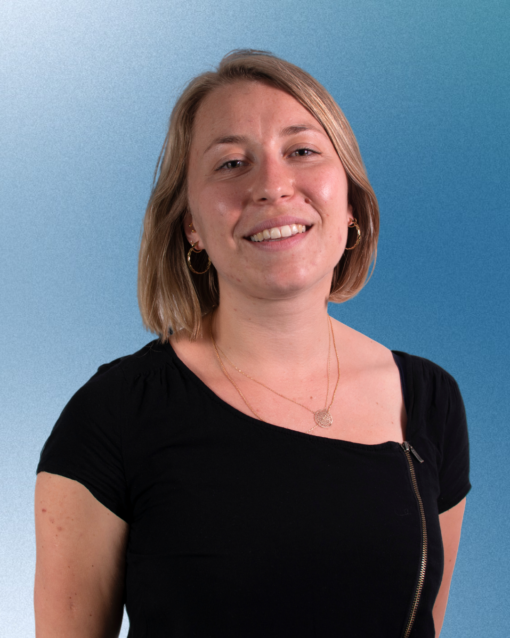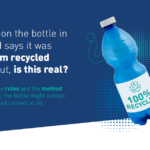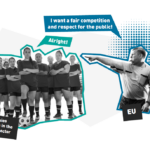
#MeetTheTeam – Lauriane Veillard
It’s time to discover and learn more about the people behind Zero Waste Europe’s work and magic! In addition to the ZWE Changemakers series, where you can learn more about our member organisations, we invite you to get a closer look at our staff, what they do, and what inspires them to work for a zero waste future.
This time, we sat down with Lauriane Veillard, our Chemical Recycling and Plastic-to-Fuels Policy Officer, who has been at Zero Waste Europe since 2022.
How did you come to join Zero Waste Europe?
I joined Zero Waste Europe because of its commitment to tackling the waste crisis, which I see as one of the most visible signs of the dysfunctional system we are living in. I also felt a clear alignment with my own drive to fight to preserve our planet and human health. The last two years at ZWE have opened my eyes and changed how I approach the world, something that I am very thankful for.
What motivated you to advocate for the development of ambitious and sustainable legislation on chemical treatment of waste?
Before diving into the question, I would like to explain my area of work a bit: chemical treatment of waste is a way to recycle or recover waste through the use of chemicals and/or without a thermic reaction. These are new types of processes which are being developed with the aim of handling waste without requiring incineration or landfilling. Circling back to my motivation, the position presented me with an opportunity to work more closely on the chemical aspect that I studied during my degree, while also allowing me to fight for the environment and its preservation as part of my job.
What would you say is the most interesting part of your job?
As far as I can remember, I’ve always loved learning new things and questioning them. In the case of my work, and more specifically on the subject of chemical recycling, changes and new research are constant. I find it interesting to question whether these changes are needed in the new society that we want to create, and if they should be prioritised or not. Another really important and interesting aspect of my work is that it is a very specific and technical subject, which needs to be better known and understood outside of the industrial and scientific spheres. This is why I love to share what these technologies mean in reality.
What would you say is your greatest professional achievement while working at ZWE?
I am currently working on a campaign on the definition of recycled content. As part of it, we’ve published several studies, position papers, and infographics, which I am really happy with (check them out here). The overarching goal is to ensure transparency and traceability to the benefit of consumers and citizens, thereby avoiding greenwashing becoming the new norm in the EU. As consumers, I think we are entitled to have all the information about a product, including the different parts that make it up.
What are the biggest challenges that you face in your work?
When it comes to chemical recycling, the biggest challenge is two-fold: people aren’t really looking into the subject, either because its seeming complexity scares them off, or because the large amount of misinformation and misleading claims deceives them into thinking of chemical recycling as a silver bullet.
I try to overcome this by making sure that I take the time to educate myself on the subject and digest the new information, after which I share my knowledge openly with allied organisations to build a common understanding and front to fight against misleading claims.
What is an aspect of your work that you find fun?
The most fun part of my job is developing campaigns, and at ZWE we have “carte blanche” to be as creative as we can, even bringing football rules into the subject of chemical recycling.
See the full infographic here: Mass balance – time to play fair
In your view, which actions are needed to achieve a fair and transparent recycling landscape?
Before speaking about achieving a fair and transparent recycling landscape, we should first define what we mean by ‘recycling landscape’ and how it has evolved. Until a few years ago, recycling was only about mechanical recycling, which is a physical process to recycle and clean materials. In 2019, “chemical recycling” emerged as a new concept; while a lot of different technologies have been placed under this umbrella, the debate on what should or should not be labelled chemical recycling is still ongoing.
What is key for the recycling landscape in Europe is that the most sustainable solution is prioritised and that other solutions only come in when needed, for example, when the preferred solution isn’t able to handle a specific type of material. For chemical recycling more precisely, clarity and transparency are essential. Indeed, to have a robust framework, we need clarity between all technologies and to be able to differentiate based on their inherent process. Regarding transparency, it is also key that all claims made are supported by readily available data.
Looking ahead, which developments or priorities will you be focusing on in your work?
Currently, my biggest priorities are the Single-Use Plastic Directive (SUPD) and the Packaging, Packaging Waste Regulation (PPWR). For the upcoming vote on the SUPD, I am focusing on ensuring that all players play by the same rules, and that transparency stays a key focal point, as it will be the basis for environmental claims made by consumers. For the PPWR revision, I am focusing on ensuring that recycling packaging becomes a more efficient process and only comes after reduction, prevention, and reuse have taken place. In the long term, I will also look into the field of textiles, which is one of the biggest industries when it comes to waste generation.
Are there any other resources or topics that you want to highlight?
Do not hesitate to browse our library with the focus on chemical recycling, and perhaps a little tip, start with the oldest publications, so you will be able to see how the thinking of ZWE has developed on this topic. But in general, keep an eye out for new ZWE publications on chemical recycling, as well as the work of our members on the topic, who are acting at local and national levels to make our cities and industries transition to zero waste models.
Want to learn more about Lauriane and her work? You can reach out to her at [email protected]


